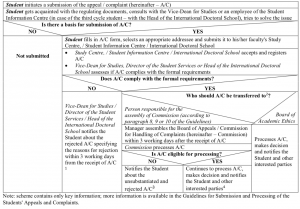Firstly, before submitting an appeal the student must be familiar with the field, in which the violation was possibly made, the regulatory documents and other important information of that field. A consultation with the studies prodecan should take place if necessary. Its highly recommended that the problem that has arisen, should start to be dealt with, through a university worker, division, committee or another one of the universities governing bodies.
Secondly, the student has a right, before submitting an appeal, look through his written work, or other type of task, or be introduced to the conclusions of why that kind of decision was made.
When the student is familiar with the field in which the violation was made, the regulatory documents, and after looking through the written work, task, after being introduced to the decision, and if even then there are arguable violations, an appeal can be submitted.
Regulatory document – Guidelines for Submission and Processing of the Students’ Appeals and Complaints


